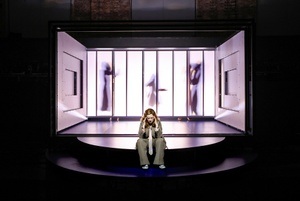In the organizer's words:
"After Midnight" tells the story of two days in 1936, when nineteen-year-old Sanna flees to her brother Algin, an author who has been banned from writing. Between parties, cafés and pubs, she recognizes the growing ideological appropriation of her immediate surroundings. Keun's exile novel vividly depicts everyday fascist life - her second international success after "Das kunstseidene Mädchen".
"Is the border a line, what is it? I don't understand it.
A train stops running, that's the border.
Men come, open suitcases, search and rummage - border means being afraid."
"After Midnight" tells the story of two days in 1936. In this short period of time, a new reality condenses for nineteen-year-old Sanna: denunciation becomes the social currency, violence the norm. The young protagonist has to leave her lover Franz behind and flees to her brother Algin, a once celebrated writer of the Weimar Republic who is now banned from writing. In Algin's luxurious artist's apartment, she encounters a society that, between excessive parties, visits to cafés and intellectual discussions, can only seem to distance itself from the looming horror. Sanna begins to understand the ideological pervasiveness of her surroundings - be it in her friend Gerti's love for the Jewish Dieter Aaron, which is shattered by the racial laws, or in the denunciation by her own aunt, who reports her to the Gestapo for critical comments on Nazi propaganda. Everyday life is increasingly characterized by fear, control and opportunism. When Franz has to flee, Sanna also makes a decision: she accompanies him into the unknown. After midnight, another life begins.
Irmgard Keun published "After Midnight" in exile in 1937. However, the main parts of the novel were still written in National Socialist Germany - which gives it a special immediacy. In it, the author creates the image of a young woman searching for her role in a deeply contradictory society - between conformity and rebellion. Keun's characters are not heroes or monsters, they are people as we know them: from families, circles of friends, offices, pubs. They become accomplices or resisters - not out of conviction, but because they simply want to live their lives.
In her first production at the Residenztheater , Cosmea Spelleken, whose work is created at the interface of film, theater and media art, brings Keun's powerful portrayal of "German reality" in the Nazi state to the stage. Klaus Mann wrote about Keun's novel in 1937: "A shudder runs down our spine ... it is pitiful, shameful and unbearable that the truth looks like this."
This content has been machine translated.













